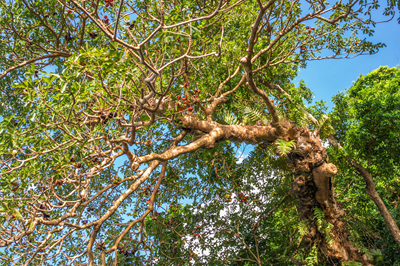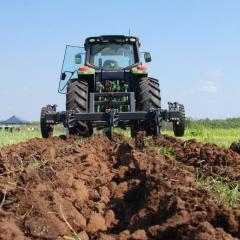
Methane emissions from cattle could soon be reduced, thanks to a new University of Queensland research project testing the effects of a native Australian tree on cows’ diets.
Dr Sarah Meale, from UQ’s School of Agriculture and Food Sustainability, is part of a UQ team that will soon investigate oilseed meal derived from the pongamia tree as a potential feedstock, thanks to an Australian Research Council Linkage Project.
“As scrutiny on greenhouse gas emissions increases, Australia’s red meat sector will face major challenges remaining profitable and expanding access to export markets, while rapidly decarbonising the beef value chain,” Dr Meale said.
“But this common, legume tree, found in northern Australia, throughout Asia and the Pacific Islands, could be one of the solutions critically needed.
“This project will quantify if the oil remaining in the seed pod after extraction may contribute to reduced methane emissions in ruminant livestock, and its suitability as an alternative, cheaper protein source.
“And by growing more long-lasting, perennial trees, we’ll also be able to sequester more carbon on the feed production end too.
“It could really be a way to systemically change the climate impact of Australia’s beef production.”
The project will also be modelling different production scenarios needed for a carbon-neutral Australian beef industry, including silvopastoral options.
New technology can now process the tree’s seed pods to make it palatable for consumption, as it’s previously been known for its bitterness, when fed to animals.
Pongamia could also provide a valuable new source of carbon offsets consistent with other tree-planting schemes under Australia’s Emission Reductions Fund.
“A recent study in semi-arid India estimated that a pongamia plantation could accumulate around 35 thousand hectares of biomass after eight years, once the trees reached 15-20 centimetres in stem diameter,” Dr Meale said.
“Demand for new tree-planting schemes is expected to grow substantially in Australia, as corporate commitments to net-zero business transitions increase.
“Developing a new domestic pongamia industry based on the high-value oil and meal products, would deliver carbon credits at a much lower unit price than other tree crops grown primarily for sequestration or timber harvesting.
“It’s early days, but pongamia may have the potential to reduce cattle emissions, keep our beef producers profitable and sequester a significant amount of carbon.”
The project is a collaboration between UQ’s Dr Sarah Meale, Dr Alwyn Williams and Dr Tyron Venn, Monash University’s Dr Paul Dargusch, University of Sydney’s’ Prof. Alex Chaves, as well as partner organisations Terviva, MLA, The Australian Agricultural Company, Arrow Energy, Santos, Australia Pacific LNG, and Troforte innovations.
Media: Dr Sarah Meale, s.meale@uq.edu.au, +61 474 745 501: Faculty of Science Media, science.media@uq.edu.au, +61 438 162 687.



